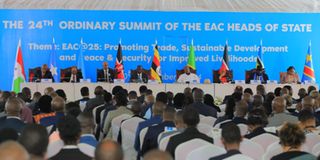EAC heads call for strategic focus on regional benefits, development

East African Community (EAC) heads of state and government participate in a summit that coincides with the 25th anniversary of its establishment held in Arusha on Saturday, November 30, 2024. PHOTO|COURTERSY
What you need to know:
- They made the call during the 24th Summit of EAC member states, which coincided with the 25th anniversary of the community’s establishment in 1999.
Arusha. The East African Community (EAC) heads of state have called for a broader reflection on how member countries can better capitalise on the opportunities within the community.
They made the call during the 24th Summit of EAC member states, which coincided with the 25th anniversary of the community’s establishment in 1999.

Tanzania President Samia Suluhu Hassan
The leaders emphasised the need for a deeper examination of whether the member countries benefit from the opportunities offered by the community.

President Samia Suluhu Hassan
Delivering her remarks, President Samia Suluhu Hassan acknowledged the significant achievements over the past 25 years, calling for reflection on whether the region’s economies are truly benefiting from the available opportunities.

Uganda President Yoweri Museveni
“Among our community’s successes is the expansion from three countries to eight, which is a point of pride. But are our economies fully reaping the benefits of the opportunities before us? The community should address these issues and develop strategies to ensure we benefit effectively,” she said.

Kenya's President William Ruto
President Hassan also took the opportunity to commend Ugandan President Yoweri Museveni, who, along with the late Presidents Daniel arap Moi and Benjamin Mkapa, played a key role in re-establishing the community in 1999, building on the vision of the late President Ali Hassan Mwinyi.

Somalia's President Hassan Sheikh Mohamud
“President Museveni has been a teacher, a peacemaker, and a guiding leader in our community. Whenever we risk straying from our core principles, he brings us back on track,” she said.

South Sudan's President Salva Kiir
Burundi's Vice President, Prosper Bazombanza, said while the 25-year milestone is a time to celebrate, it also helps to assess whether the community has achieved its goals.
“It is an important step for us to grow—not just in size, but in efficiency. Our slogan of strengthening trade, sustainable development, peace, and security should be reflected in tangible improvements in the lives of our people,” he said.

President William Ruto of Kenya (left) and Rwanda's President Paul Kagame (right)
Rwanda’s Minister of Justice, Emmanuel Ugirashebuja, who represented President Paul Kagame, highlighted two key challenges facing the community including member states' failure to meet financial contributions, for which he called for strong action.

Rwanda President Paul Kagame
“We need effective measures to ensure that contributions are made, including those set by the African Union, which have helped bring success to member states,” he said.
Minister Ugirashebuja also expressed concern about the decision by the East African Standby Force to withdraw from peacekeeping operations in the eastern Democratic Republic of Congo (DRC), saying it violated a joint directive from the Heads of State.

The President of Kenya, William Ruto, takes over the Chairmanship of the EAC from the President of the Republic of South Sudan, Salva Kiir.
“The decision to end military authority in the DRC undermines the directive of our leaders, leading to confusion, eroded trust, and a lack of transparency. Rwanda remains committed to fulfilling its responsibility to ensure regional security and aims for meaningful and successful results,” he said.

Somali President Hassan Sheikh Mahmoud also spoke about the community's successes, including the recent addition of Somalia as a member.
He noted that since joining, Somalia has taken significant steps to align with the community’s goals, including the common market, customs union, financial protocols, and political federation.
“Since joining, we have prioritised implementing the community’s programmes to ensure Somalia’s integration into the regional framework,” he said.

Kenyan President William Ruto, who assumed the bloc chairmanship during the summit, emphasised that during his tenure, he would work to ensure the community achieves its vision and brings development to the people.
“During my term, I will prioritise improving the quality of life for our people. We will focus on enhancing competitiveness in value-added goods, boosting trade across our borders, and increasing investment in our region,” he said.
On trade, President Ruto highlighted its vital role in the community’s success.
“Today, a small business in Jinja can sell its products in Mwanza, and a farmer in Kigali can find a market in Nairobi. Our entrepreneurs now have access to a market of approximately 300 million people within the community,” he said.
He also called on member states to fulfill their financial obligations, ensuring the EAC Secretariat has sufficient resources to carry out its duties.
“I urge the leaders of the member states to meet their responsibilities by contributing to the community’s budget. This will enable the EAC Secretariat to carry out its mission efficiently,” concluded President Ruto.
EAC Secretary-General Veronica Nduva announced that the 25th anniversary celebrations will continue until June 2025, with different planned activities across the member states.
In a related development, President Ruto was officially endorsed by the EAC Heads of State to lead the community for a one-year term, taking over from South Sudan’s President Salva Kiir Mayardit.
President Kiir held the leadership from November 24, 2023, with President Ruto expected to lead the community until December 2025.




